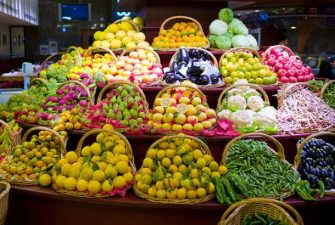 How do you like your fish? Pumped up with a strong chemical cleaner called STTP (sodium trippolyphosphate), or without?
How do you like your fish? Pumped up with a strong chemical cleaner called STTP (sodium trippolyphosphate), or without?
Despite it being an important fish producing nation with active fish farms, on land and at sea, two-thirds of the frozen fish sold in Israel is imported from China.
Most Israelis complain that frozen fish is tasteless, but pick up a bagful of fillets for convenience all the same. We are resigned to paying for the 20 percent of water stated on the package – an ice covering to protect the fish, we’re told.
But until last January, the Israeli consumer didn’t know that they paying for much more water than that. Water that’s been forced into the flesh of the fish by a chemical process. That makes it heavier. And the importers richer.
“They sell us ice and water for the price of champagne,” said Dr. Moshe Rafaelovitch, from the Association of Veterinarians in Israel.
The scandal was exposed in January 2010 by Kolbotek, the Israeli consumer-awareness TV program. Kolbotek conducted an undercover investigation, sending a reporter with a hidden camera to two Chinese fish factories. On the second of the videos (below), we see filleted fish washed with STTP-laden water to make them heavier.
In one factory, the workers (wearing full body protection and masks) pound and pierce the fillets to make them accept even more water. The flesh of fish doesn’t accept water naturally; waterlogged fish would sink in their watery habitat and the species would die out. After undergoing this process, the fish are covered in water again and flash-frozen.
Water, chemicals, and ice: That’s what Israelis get in a package of frozen Chinese fish, with the connivance of the importers. No wonder the fish doesn’t taste like fish: its taste has been diluted with water and STTP, or sodium tripolyphosphate. Sometimes you’ll see the chemical labeled innocuously as E451.
So what is sodium trippolyphosphate? Everything has a fancy chemical name. Even salt sounds scary if you call it sodium chloride. Lots of processed foods have acceptable chemicals in them – what’s the scandal here?
A few grim answers:
- STTP is a strong chemical cleaner. It is used commercially in household cleaners, toothpaste, laundry detergents, dishwasher tablets, and toilet cleaners.
- You may view a Material Safety Data Sheet on STTP here. It states:
- Potential Acute Health Effects:
Very hazardous in case of eye contact (irritant). Hazardous in case of skin contact (irritant), of ingestion, of
inhalation. Slightly hazardous in case of skin contact (sensitizer, permeator). Inflammation of the eye is
characterized by redness, watering, and itching.Potential Chronic Health Effects:
CARCINOGENIC EFFECTS: Not available.
MUTAGENIC EFFECTS: Not available.
TERATOGENIC EFFECTS: Not available.
DEVELOPMENTAL TOXICITY: Not available.The substance is toxic to lungs.
Repeated or prolonged exposure to the substance can produce target organs damage.
- Some imported frozen fish has levels of STTP higher than permitted by law.
Up till January, the public wasn’t informed by the manufacturers, or by the importers, that most frozen fish is not natural but processed. Most of us still sling the packages of frozen fillets into the shopping cart and pay, unaware that we’ve been denied an informed choice.
And what about the pain in your pockets? Why should you be cheated of fish and pay for water instead?
We had a look at the frozen fish section in the supermarket last night. True to what Kolbotek claims, there was only one frozen fish that had “100% natural” on the package. All others stated the presence of 20% water. Yet according to laboratory reports that Kolbotek received, some varieties carry as much as 41.3% (sole) – the Delidag brand plaice (zahavon) had an incredible 59.5% water plus 33.9% ice. The consumer is paying for less than 7% fish in the package.
We called the customer service number printed on the Delidag label. The service representative became surly when I asked if anything had changed since the Kolbotek program. “The labels state ‘contains phosphates,’ she said: “They always have.”
We are sorry to contradict, but it ain’t so.
Importing companies have access to fish that hasn’t been processed, and could be bringing that in. They choose not to. Obviously it’s much more profitable to sell water instead of raw materials.
China’s a country that’s never been much concerned with human rights or the value of dangerous chemicals they put into food or children’s toys . But we wonder if the importers allow their own wives and children to eat that frozen fish?
More stories on what we eat:
- How Green is Your Garlic?
- GM Foods Shrinking Sexual Health in a Womb Near You
- Meat Prices High? Switch to Vegetarian




what about nile perch, does it also fall into the pumped and toxic category? as far as i know it comes from tanzania, anyone know anything about this fish that is sold en masse in israel?
Thanks for your kind comment, h cote.
it is the same story here in the US… fish, chicken especially are bad, some brands just loaded with “broth solution” as it is termed here. also i am finding more often that frozen fruits & vegetables are receiving the same treatment. here it is known as “flash freezing” and its touted as being a ‘healthier’ way to ‘lock in freshness & nutrients’…
but after seeing & tasting the quality go downhill, i am not so sure. Buyer beware, if you are able: READ & RESEARCH EVERYTHING… especially if you suffer chronic health problems. its just how it is now.
i appreciate your informative articles Miriam. please keep them coming
Sally, the sole (pictured above) is an even bigger fraud. When you thaw out the nice plump package, all you left is a few skinny, limp little fillets that taste slightly sour but not much like fish.
i actually just experienced this fish fraud.i couldn’t resist the cheap price so i bought delidag zehavon-after the ice and the pumped -in -water+chemicals melted,i was left with maybe 20% fish!
maybe they should write on the package up to 20 % fish!!!
I will never ever buy frozen fish anymore!! Especially not fish from China!!
Don’t be sure that locally farmed fish is healthier. It depends what kind of fish, where it was caught, how it was raised. . .
The only frozen fish I buy is salmon, since, according to the label, that doesn’t have water added. But after this expose, I’m going to stick to fresh fish, even though it’s less convenient to obtain. But I will check to see if my local health food store carries the Adama brand. Thanks for the tip.
Pat, if the article has encouraged readers to examine labels and make an informed choice, it’s been effective and useful. In any case, the packages of imported fish do state on their labels that the country of origin is China. What they still don’t say is that the fish has been processed.
I also think the brand names will vary depending on the country you are in. Each locale will have its own label, depending on the distributor. It’s important that the issue was raised and now we’ll look forward to many more articles on this topic.
It would have been a far more useful and effective article if specific brands and types of fish were mentioned that were those being imported from China. I hope everyone examines the writing on every product from now on.
Hi Bear,
I think Aaron below offers some good tips. Part of the problem over here in the Middle East is that there is simply no awareness to the fact that people should be concerned about what’s in their fish. Coming from Canada, I know there are fish more safe and less safe to eat, which ones have high mercury content and which ones to avoid. It’s hard to know what’s happening with your fish if it’s being important and if local bodies aren’t publicizing risk factors for children and pregnant women. Mercury and other contaminants in fish can cause cancer and chromosomal damage. I think Miriam’s article is a great first step in illuminating the problem to the international community. We need more articles like this.
-Karin
Why just fish. What about fresh chickens. They also have water/liquid added to them. Take some fresh chicken breast, freeze for a day or two and then defrost and you will find a thickish liquid is part of the defrosting process!!
Naomi
You should check out the organic fish grown on Kibbutz Geva. It’s sold either at the kibbutz, at David Dagim in the Machane Yehuda Shuk in Jerusalem, or Frozen under the Adama organic Label. It’s sustainably grown without any chemicals, and tastes amazing!
This and all these so-called “green” articles are B–ls–t! Why? all it does is scare people. If they really want to be helpful with their ‘green’ news flashes, DO SOMETHING ABOUT IT AND REPORT THAT!
Yes, it’s scary what goes into our food. Natural enzymes from papaya have been used to tenderize meat forever – and it’s no big secret…but I suppose synthetic chemicals like STTP are cheaper to produce that papaya extract.
I found this on the Wisegeek site:
The uses of sodium tripolyphosphate also include using it as a preservative. It can be used to preserve foods such as red meats, poultry, and seafood, helping them to retain their tenderness and moisture. Pet food and animal feed have been known to be treated with STPP, serving the same general purpose as it does in human food. STPP also has been used in helping to preserve the quality of drinks such as milk and fruit juices.